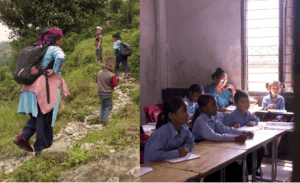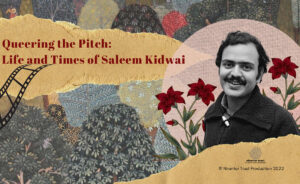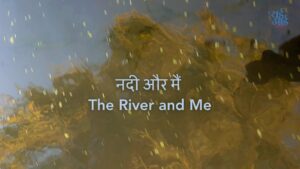“I had no relationship with this river. I went there for the first time.”
Tabassum loves looking at the world through her phone camera, something that she has learnt in the Learning Lab as part of the 18-month Digital Educators program, a feminist narrative-making and communications course run by The Third Eye, using arts-based pedagogies.
Tabassum’s struggle? To find a place “where I can shoot peacefully, without any interference from my family or neighbours, but it’s always very hard to find a place like that”.
What would you shoot, if you could?
“Open sky. Silence. A place where I can observe, not just see.”
Tabassum’s search took her to the outskirts of her city, Lucknow. “When we started working on the ‘reel’, our mentor told us to write about a fake profile we would like to make, where we could use our imagination freely. But when I started imagining, I did not write about myself. My imagination took me to a place where I could forget all my worries, like the things that happened to me after my marriage.
I wanted a place where I could get rid of all these things for some time.”
A friend of Tabassum told her about the river. “The first thing I saw when I went there was garbage. What will I shoot here, I thought. But then, I sat down quietly and began observing. I saw the river, the fisherman, the boat ferrying the people from one shore to the other. The temporary bridge had disappeared due to the heavy rains. The boat was the only connection between the shores now. The next day, I started shooting. The day I sat on the boat, I began to see all the stories that are connected to the river. I began shooting continuously. The river became the central character of my imagination, and all these stories emerged from her.”
What is the difference between ‘looking’ at something and ‘observing’ it?
“When we look with intent, with depth… when we want to find something in what we can see – things become interesting to us. What are we thinking at the time of seeing? If things don’t evolve in their meaning while we are shooting them, then why shoot them at all?” asks Tabassum.
Mentor’s Note on the making
“How do you nudge a student towards a sharper inquiry, an imagination, a question, a gaze, which is their own?” asks Ruchika Negi, Lead, The Learning Lab. “Or rather, how do you do this without dislocating her or making her lose faith in her own meanings — her own truths and discoveries, her own tentativeness?”
Tabassum was part of the Learning Lab’s first batch of the DE program, an 18-month course conducted online. “Tabassum’s magical, whimsical, all-consuming attraction to the world of Instagram reels came up again and again in our conversations,” shares Ruchika. “To be seen — this unequivocal human desire. And yet, Tabassum knew sharing any personal content online for her was a no-go, since she is a married woman.”
At the Learning Lab, we develop strategies for making in a consumption-driven world. “How can we make something productive of our limitations, our fears, our impositions? How do we generate meaning from the seemingly hopeless? If you can’t be seen, what will you show? A fundamental question of feminist practice. We made several notes,” says Ruchika. “Actually, Tabassum said, I want to be able to shoot peacefully. I want to spend time and shoot without any interruptions… no neighbor prying over my shoulder or my husband watching over me and complaining about why I work all the time… I just want to shoot. That’s all.”
She always loved the camera.
“She now desired a practice, a feeling of focus and immersion, where her mind and body could be free, agile, curious and engaged,” says Ruchika, about the moment mentors wait for. “The familiar restricted her; the river, outside her city, was ripe with promise. She was ready. Gradually, the camera helped align her body and mind through one single action of looking continuously and curiously. The camera became a medium for her to play with her desire, stretch it in different directions as one would do with clay — what new shapes and forms will she find?”
-
Tabassum Ansari lives in Hussainabad, Lucknow. Making films and photos is of immense interest to her. The relationship between the Real and Imagined; how do these two elements interact and nourish each other; the meanings that can emerge through this interplay- Tabassum has been attempting to work on these processes and questions. She works with the Sadbhavna Trust in Lucknow and is TTE’s Digital Educator.




